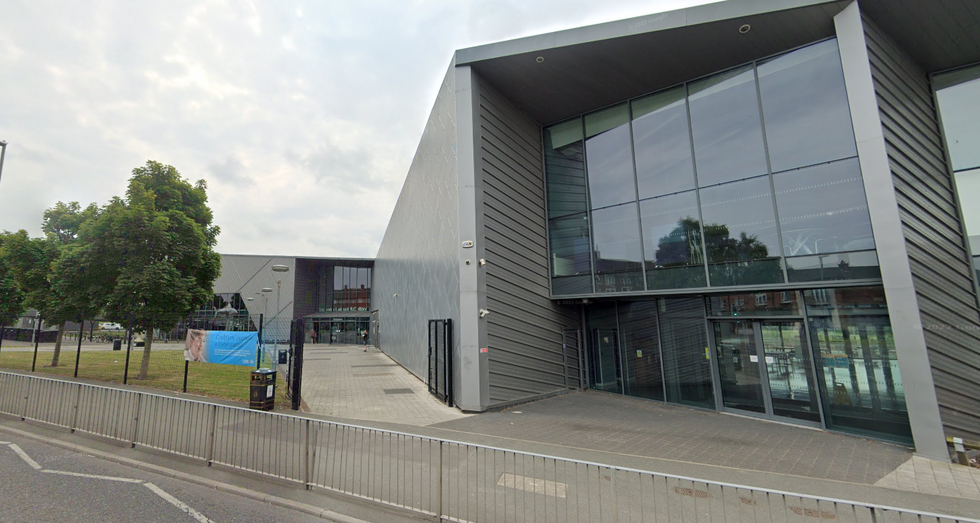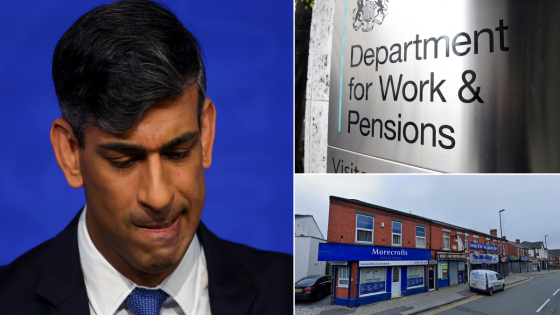One in seven adults – around 13,000 people – in a Merseyside borough are eligible to claim disability benefits, a shocking new investigation has revealed.
Residents in the Borough of Knowsley, on the outskirts of Liverpool, have made the most personal independence payments (PIP) claims out of any parliamentary constituency in the country, according to the figures.
Of the thousands of claims, Knowsley stands out for the frequency of locals’ mental health-related payments, with the area ranking among the highest in the country for conditions like depression and anxiety.
All of the top four constituencies in the UK for PIP claims are in Merseyside, according to data from the Department for Work and Pensions (DWP) – with a staggering 3million Britons slated to claim the benefits by 2025/26.
Merseyside mental health charity bosses said benefits claimants were “terrified by the stuff that Rishi Sunak is saying”
PA/Google
Knowsley also suffers with the lowest female life expectancy in the country, according to figures from Public Health England.
Just under a fifth of households in the constituency were out of work in 2022, compared with the British average of 14 per cent – while two fifths of those out of a job suffer from ill health, double the national average.
A Telegraph investigation into the area painted a grim picture: a high street in decline, a failure to bounce back from Merseyside’s industry cuts from the 70s to the 90s, and residents lamenting both the statistics and their individual circumstances.
Speaking to the outlet, Lynn Wilson, community wellbeing manager at Volair Leisure Centre, said: “We’re top of every list that you don’t want to be top of.”
MORE BENEFITS NEWS:

Lynn Wilson at Knowsley’s Volair Leisure Centre, said: “We’re top of every list that you don’t want to be top of”
Across the country, 9.4million people are currently listed as “economically inactive”, with a record 2.8million neither working nor looking to work for health reasons – while the cost to taxpayers of disability and health benefits is slated to soar to £100billion by the end of the 2020s.
In reaction to the trends, Rishi Sunak slammed the rising spending earlier this month, saying: “We now spend £69billion on benefits for people of working age with a disability or health conditions… That’s more than our entire schools budget; more than our transport budget. More than our policing.”
Of that £100bn bill, over £27bn is set to fund PIPs by 2030; while they had been introduced by then-Chancellor George Osborne in 2013 as a money-saving piece of reform led by face-to-face assessments, a move to online interviews in the wake of the pandemic has seen PIP claims spike by almost a third since 2020.
Among PIP claims, “anxiety and depressive disorder” is the single most-cited health concern, with 361,000 people stating it as their “main disabling condition”, 6,000 people able to claim benefits linked to long Covid, and 14 qualifying for £9,500 in PIP every year to help them deal with haemorrhoids.
The DWP will launch a consultation as soon as this week on PIP reform, with the PM keen to introduce “access to treatment like talking therapies or respite care” in lieu of “cash transfers”.
But Andrew Kerr, programme manager at mental health group Kindred Minds Merseyside, said: “The reality is, it’s not going to support your recovery to be taken off benefits and go and be a Deliveroo rider or get a zero-hours contract in the supermarket and have to work 60 hours a week in order to pay the rent.
Kerr claimed the PM’s proposed benefits clamp-down would worsen people’s mental health problems because it would bring them new stress, adding: “They are terrified by the stuff that Rishi Sunak is saying.”
A DWP spokesman said: “We’re proud to ensure a safety net that is generous for those who genuinely need it – and fair to the taxpayers who fund it… We will review our disability benefit system to ensure it is fairly and accurately targeted at those who need it most and channels people towards the right form of support for their needs.”
Source Agencies



